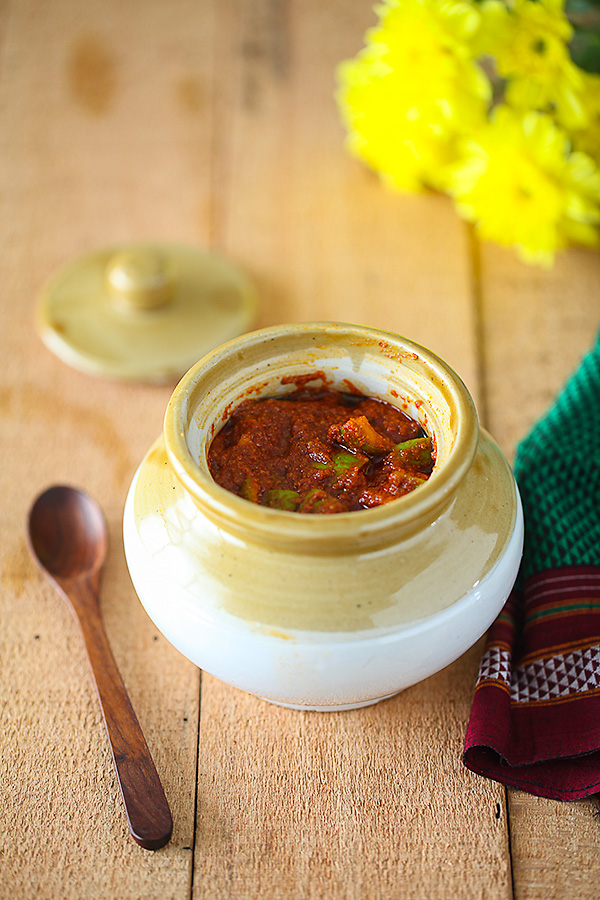
As a child and even well into my adulthood, I always ended most of my meals with mosaranna (yogurt rice) and uppinkai (pickles). This is a ritual followed in most Brahmin homes across the different south Indian states.
I would not be wrong if I said that mango pickles evoke strong memories in the heart of any Indian man or woman. Up north it would be memories of savouring spicy raw mango pickles with buttered parathas and yogurt on the side. Down south it would be memories of savoring mango pickle with yogurt rice and papad (pappadum or happala) on the side.
And with the intermingling of cultures, most of us would be subject to delicious meals comprising of dishes from the north, south, west and east with the mango pickle by the side.
I have tasted mango pickles made by friends and different family members. In my family, about 7 to 8 varieties of mango pickles are made.
The recipe that Im sharing today is a mix of my grandmother and aunt's pickle recipes. I made this recipe last year and loved it but never got around to sharing the recipe as I got busy with my brother,s wedding and my nutrition exams thereafter.
This year I had no plans of making mango pickles until my mother's parcel arrived bearing farm fresh raw mangoes with the most delicate and fragrant aroma.
While the western world is discovering the benefits of fermented foods, the age old system of medicine in India, Ayurveda recommends eating fermented foods like pickles to stimulate agni or the digestive fire required to digest food.
Pickles also stimulate certain digestive enzymes in our saliva which further enhances the taste and the digestion of food. Once the agni or digestive fire is stimulated it also dissolves ama or toxins in the intestinal tract.
Due to improper research and subsequent propagation of the same, pickles have got a bad reputation in the past decade owing to their salt and oil content.
Considering the points mentioned above, a little home made pickle made with good ingredients and without any preservatives taken with meals will not only provide satiation but also give some medicinal value.
Grandmother's wisdom cannot go wrong after all, isn't it?
Make these pickles while raw mangoes are still in season and enjoy it throughout the year.
Raw Mango Pickle Recipe
Classic raw mango pickle made with pickling spices like mustard, fenugreek, chilli, turmeric and asafoetida.
Ingredients:
500 gm (4 cups) raw mango
150 gm (1/2 cup) salt
5 tbsp yellow mustard*, roasted and powdered
1 tsp fenugreek seeds (methi), roasted and powdered
1/2 cup red chili powder
1 tbsp turmeric powder
175 ml (3/4th cup) oil
1 tsp strong asafoetida or 2 tsp yellow asafoetida
Method:
Clean the raw mangoes with water and wipe dry with a clean towel or kitchen tissue paper.
Cut the raw mango into ½ cubes with the skin intact, discarding the seed.
In a heavy bottomed pan, roast the mustard seeds for a minute or two. Allow to cool and blend in a mixer/grinder until it turns into a fine powder. In the same pan add in the fenugreek seeds and roast them on low heat for 2 to 3 minutes until they change colour. Make sure they do not turn darken.
Place the cut raw mango pieces in a clean bowl and add salt over it. Mix well with a clean and dry spoon and keep aside for 1 to 2 hours or until you can see water in the bowl. The interaction of the raw mango with the salt should produce a lot of brine or salted water.
All you have to do next is add the rest of the ingredients, the roasted yellow mustard powder, roasted fenugreek powder, red chili powder and turmeric powder.
Heat the oil in a pan over moderate heat and once the oil is hot enough but not smoking, add the asafetida and turn off the heat.
Once the oil is cool, add the oil into the raw mango and spice mixture.
Transfer the pickles into a clean and sterilized jar (see notes).
The pickle would be ready to eat in 5 to 7 days.
Notes:
Well made pickle can last for years. Follow these tips, if you don't want your pickles to get spoilt.
- Use squeaky clean utensils for making the pickles.
- Make sure your hands are clean and dry during the entire process of pickle making. Even a drop of moisture can spoil the pickles.
- Before making the pickles, keep the jars ready.
- Wash and clean the jar in which you plan to make the pickles and allow it to sun dry for a few hours until the jar is completely dry.
- Alternatively, heat the jar and the lid in a 150C oven for 10 min. Cool to room temperature before adding the pickles into the jar.
- Use tender, firm and unripe mangoes for best results.
To receive recipes, tips and inspiration that feeds your body, mind and soul subscribe to Divine Taste newsletter
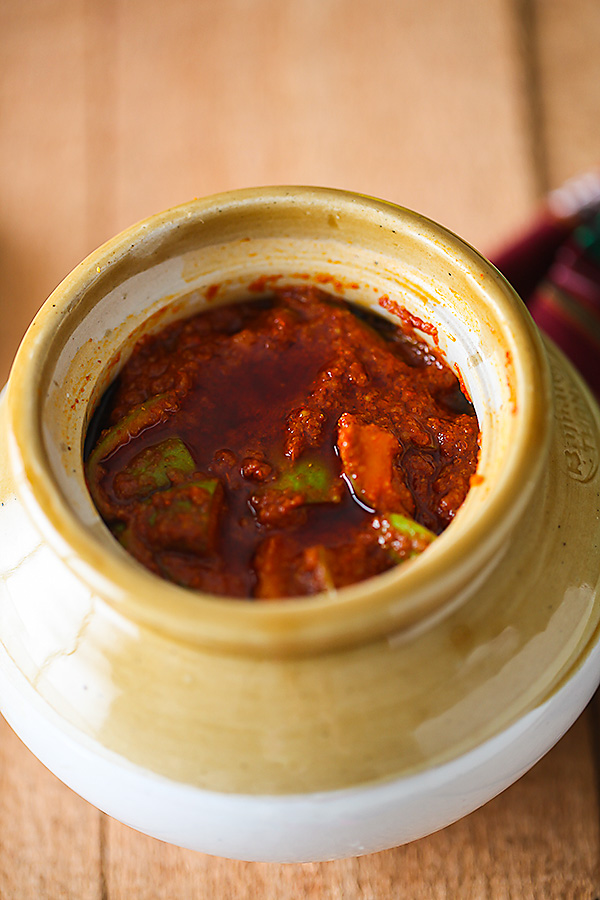
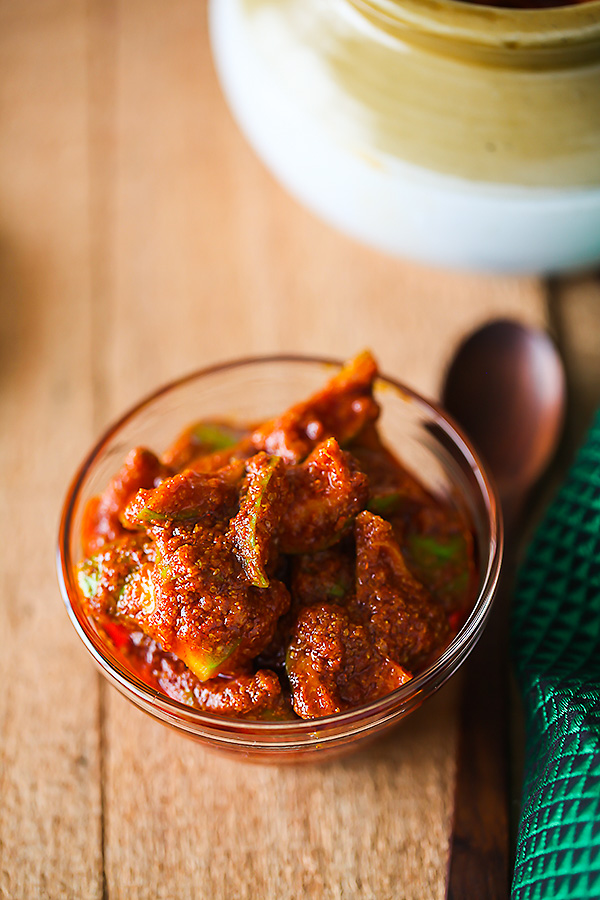
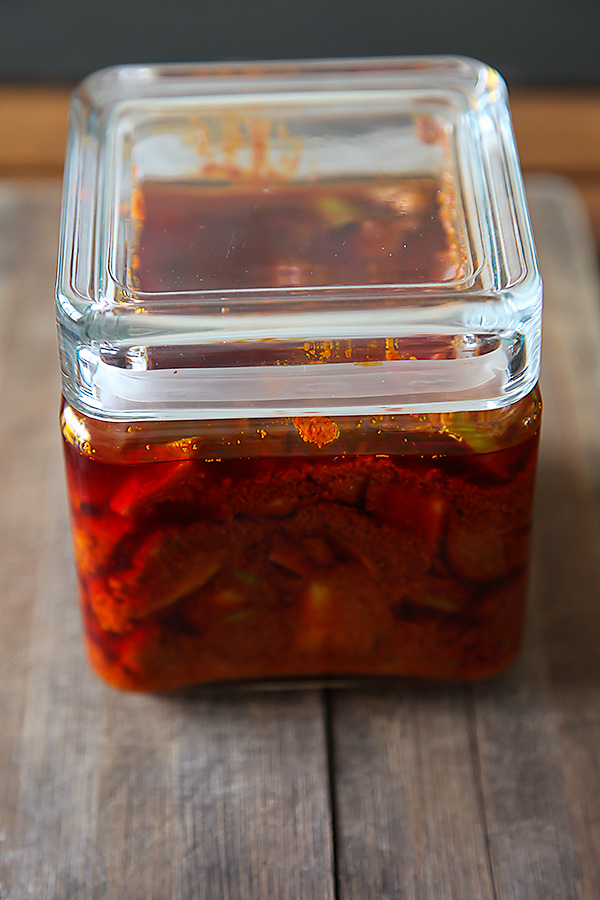
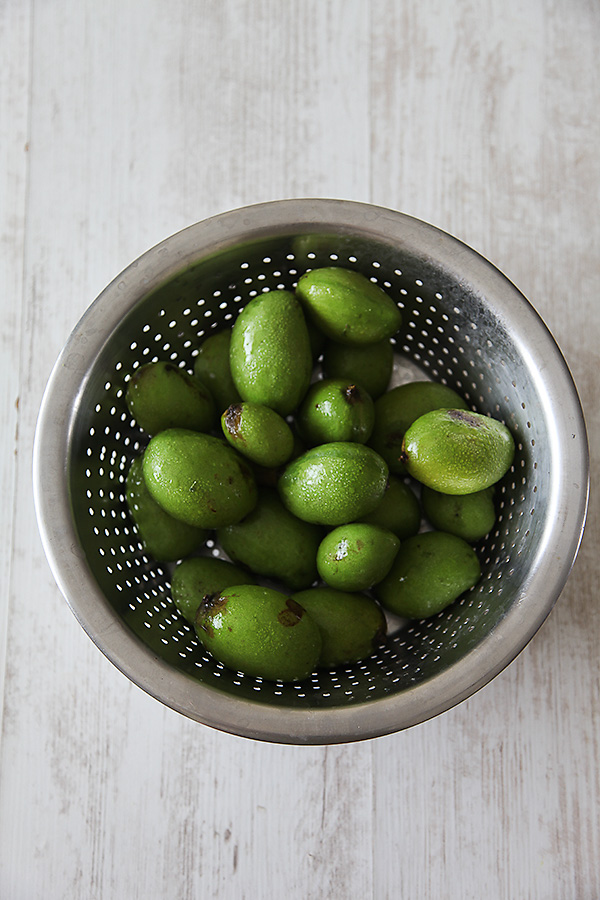
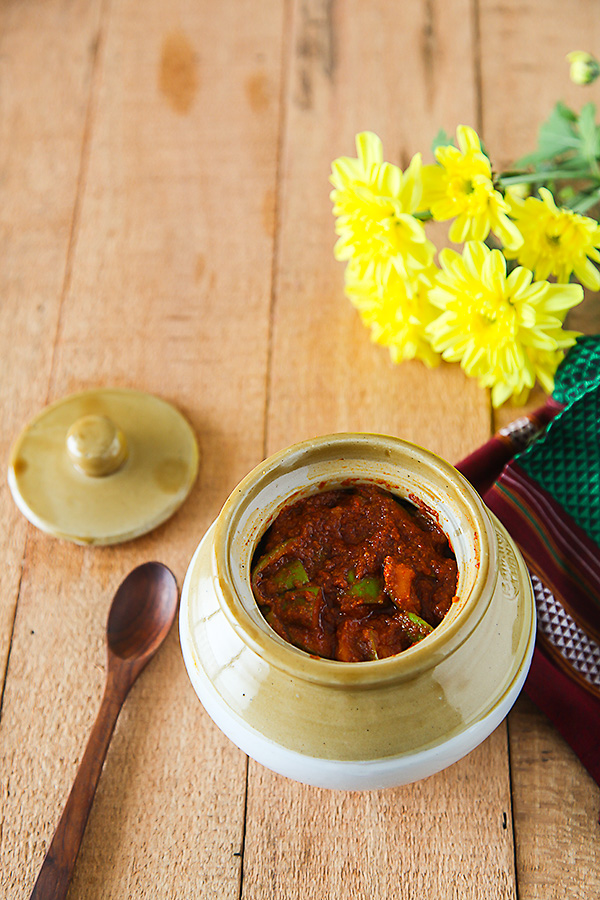
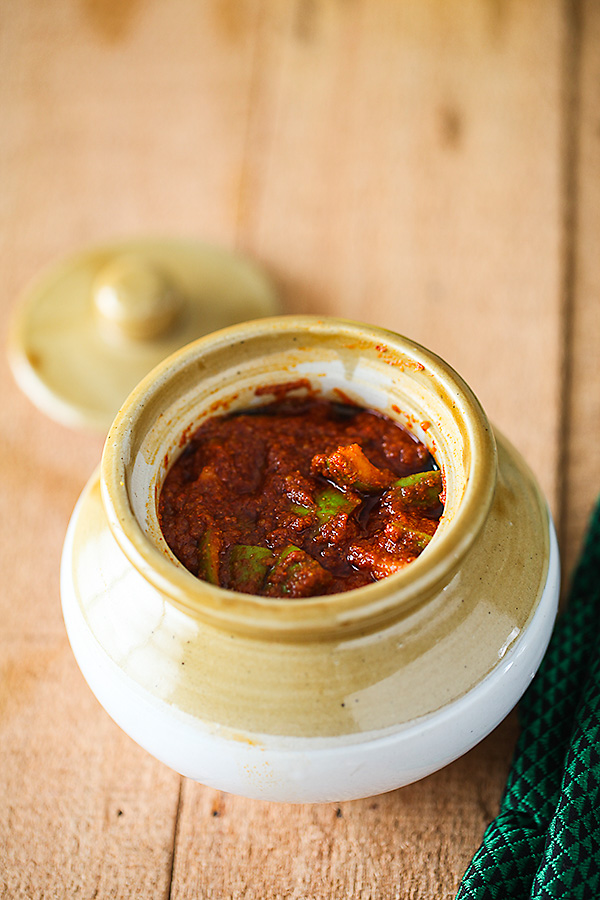

Hi
Do you add the briney juice that's released from the mangoes into the cooled oil?
Or is that discarded and if so, are the mango pieces patted dry before adding to oil?
Also, I've never used yellow mustard seeds (I presume they'd be found near the black ones in the shops). I've never actually noticed them, but will go source them.
Thanks
Definitely will give it a try…
Dear Madam,
Your pickle looks good. This is how our mothers and grand mothers made and we also thought that this is the traditional way of making healthy pickle. But unfortunately, this is not the pickle that is mentioned in ayurveda. Since you have mentioned about Ayurveda in this post, as an Ayurvedic healer, I would like to let you know that good pickle (as mentioned in ayurveda/siddha) DOES NOT contain red chilli or oil in it. Vegetables are soaked in salt and sun dried for few weeks. This is the real pickle which has lot of health benefits. The one which has red chilli powder and oil increases Pitta in the body. The heat from the red chilli also increases Vata and oil increases Kapha. So if we need to get the goodness of the fermented food like pickle, please do not use red chilly or oil in it. Make it in the traditional way mentioned in Ayurveda/Siddha.
Regards,
Divya
Hare Krishna Anu,
thank you for your amazing recipes and I like reading thru different stories that you write along with the recipe. I have tried many of your recipes and it always turns out well.
A small correction in this write up -"In the same pan add in the mustard seeds and roast them on low heat for 2 to 3 minutes until they change color. Make sure they do not turn darken."
I think you meant Methi in this sentence, thought you wouldn't have noticed it 🙂
Ayurvedic benefit of pickle that you mentioned really makes senses :)Good job keep going. Good luck. Thank you once again for all fine recipes.
Thank you !!!
This pickle looks divine
Much awaited pickle recipe from your kitchen. Would like to know the mango variety that u have used in this pickle. Will definitely give it a try.many thanks.
Thanks For such tasty pickle rceipe.
we bengalis also make pickles from raw mango. but not with fenugreek. good to know new recipe with innovative variety
Mango pickle with Dal in rice gives the divine taste.. best combination ever… thanks for the recipe Anushruthi..
Hello Anushruti,
I love all your recipes and have tried some of them with great results. I notice that in the mango pickle recipe here, the third paragraph talks about roasting mustard seeds twice…would one of these be roasting fenugreek seeds? Can you please double check and confirm?
Thanks
Sukhbinder
Thanks Sukhbinder. I have made the changes.
You are welcome Sudeesh. 🙂
Regular raw mango.
Thank you!
Thank you sangeetha. Correction already made.
Hi Ferhana,
Yes, you have to use the briny water.
Thanks for amazing recipe….
https://indianzaayeka.blogspot.com
I like mangos, I will try this at home. I love mango pickle. Thank you great post .
You are welcome Pooja. You will love it.
Mouthwatering Fabulous recipe. I love Andhra style avakaya/ mango pickle. the making process shown here looks very clear. I feel like it will be helpful and useful to the people who stay far away from homes and pickle lovers. I will be giving a try this weekend. Thanks a lot.!
Thank you for sharing my favaorite Mango Pickle making process. it looks simple and easy with little care. can't wait to taste the homemade and handmade avakai. This is going to make my Rainy and Winter seasons Interesting.! Thank You.
Good to hear that Siva!
Thanks for your feedback!ðŸ™ðŸ¼
Thank you for your amazing raw mango pickles recipes. the mango pieces in the pickle were just perfect in terms of texture. mango pickle with curd rice give the divine taste.